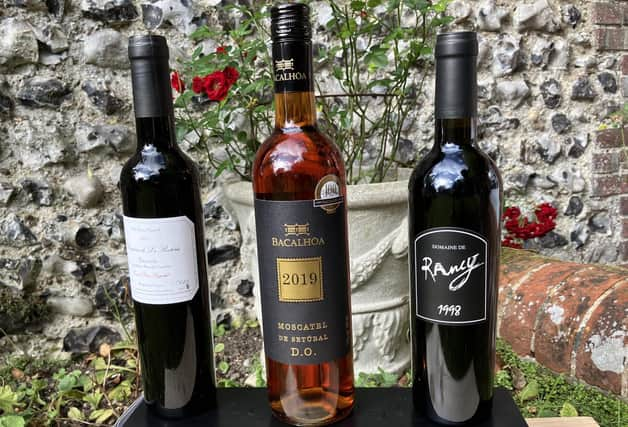Get fortified this autumn for the coming winter


Love it or hate it Sherry (I love it!) comes from southern Spain and is fortified (the addition of neutral grape spirit) after fermentation of the grapes. Port, on the other hand, is fortified during fermentation, thus stopping further action of the yeast and resulting in retention of the natural grape sugars in the wine. All port is thus sweet to a greater or lesser degree, whereas sherry can be either sweet or bone dry. The third better known fortified wine is Madeira, from the Portuguese island of the same name, made by leaving the fortified wine in a hot environment for a period of time.
However, there are many other fortified wines made in both Europe and the rest of the world, each with their own particular production method and resultant character, making interesting wines for either an aperitif or pairing with different dishes. A warm or even hot climate is essential for the production of high-quality fortified wines and these conditions are perfect in Portugal and southern France.
Advertisement
Hide AdAdvertisement
Hide AdThe Roussillon region of southern France on the Mediterranean coast produces a number of different fortified wines of great character. One range comes from near the small town of Banyuls, made from old vines and aged in barrels left out under the sun, giving a special ‘maderised’ character. Banyuls Tradition Pierre Rapidel 2017 is made by Domaine de la Rectorie and is sold in 50cl bottles. Great complexity and concentration is achieved by ageing the wine in barrels which are not topped-up for 5 years. Tawny red in colour, the aromas are of muscatel raisins, ground cloves, cinnamon and sultanas. Deliciously rich and sweet, with a liquefied mincemeat quality on the palate, which lingers wonderfully on the tastebuds. £19 per 50 cl bottle.
In the same area near Perpignan is the region of Rivesaltes, an appellation for sweet wines from both red and white grapes, which are fortified and known as ‘Vins doux Naturel’ – natural sweet wines, sought after since at least the 14th century. Made by stopping the fermentation by the addition of neutral grape spirit, they are often gently oxidised during maturation in old oak casks for at least three years. Domaine de Rancy specialises in making a range of wines mainly from the white maccabeu variety and ages the wines for many years, gaining great complexity. The 1998 has been aged in cask for 20 years and is an exquisite sweet fortified white. Aromas and flavours of freshly made toffee, caramel and dried figs, with deep mahogany colour and tremendous complexity. One of the rare wines which can pair with chocolate. Also excellent with blackberry and apple pie! £22 per 50cl bottle.
Back to Portugal, apart from the global stars of Port and Madeira, there is a lesser-known fortified wine produced in the Setubal peninsula near the capital Lisbon. Bacalhôa Moscatel de Setubal 2019 is made from 100% muscat grapes and is aged in cask to concentrate and intensify the flavours and complexity. A delicious, sweet wine with a deep amber colour and aromas of candied orange peel. Sultanas, dried muscatels and dried apricots on the palate which retains a freshness alongside the sweet and persistent finish. Great value at only £12.95 per bottle in its own presentation carton and the perfect accompaniment to mince pies or Alsatian pear tart.
All three fortified wines available from the wonderful Wine Society.